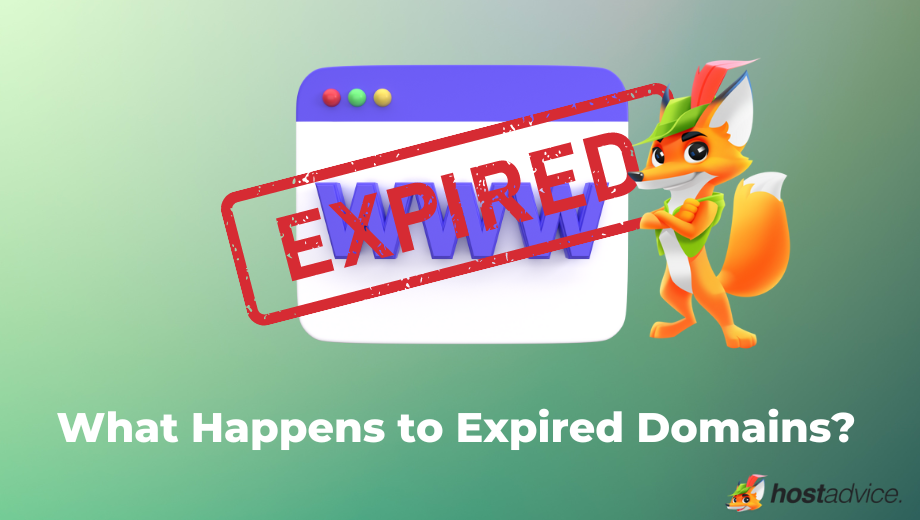What happens to Expired Domain?
Expired domains go through a phase called the “redemption period” once they expire. This phase lasts for about 30-45 days. During this time, the previous owner can renew the domain, but they may have to pay extra. If the owner doesn’t renew it, the domain goes up for auction. People who are interested in it can bid and buy it.

If the domain doesn’t get sold in the auction, it eventually gets “deleted” and goes back into the pool of available domain names. Anyone can then register it again. This whole process usually takes around 75 days from the domain expiration date. Takeaways
- When a website name expires, it’s first up for auction, and if nobody buys it, anyone can grab it
- Buying expired domains offers advantages like existing backlinks and potential traffic, but there are also drawbacks like domain history concerns and legal risks
- Understanding what happens to expired domains is vital so you don’t lose your website’s name or miss a chance to snag a good one
Don’t allow your domain to expire?
When domains expire, there are certain stages they go through before they become available for others to use. Let’s take a closer look at what happens during that process to understand how expired domains become available again.
Grace Period
The renewal grace period is typically the first 30-45 days after a domain expires. During this period, the original owner can renew the domain at the regular renewal price. It’s essentially a safety net that allows domain owners to continue their ownership, even if they missed the initial expiration date.
Redemption Period
If the domain is still not renewed during the grace period, it enters the redemption phase. This period usually lasts for 30 days. The original owner can still reclaim their domain during this period, but the redemption fee is often higher than the standard renewal fee. The domain’s website and email also cease to function during this time.
Auction
If the original owner does not reclaim the domain during the redemption period, it might go up for auction. This means that other people or businesses can bid on the registered domain. Usually, the auction lasts for about seven days. The highest bidder at the end of the auction gets to be the new owner of the domain.
Pending Delete Period
After the auction phase, if the domain remains unsold, it enters the pending delete period. This period typically lasts for 5 days. Following this 5-day span, the domain is completely deleted from the registrar’s database and becomes available for registration again by the general public.
Public Availability
If nobody buys the domain during the auction, it goes back into the public pool of domains. This means anyone can register the domain as if it were a completely new one. However, this only happens if the domain doesn’t get purchased during the auction phase.
Why Use Expired Domains
Buying expired domains can bring a few key benefits. Here’s what you might gain from it:
- Established Traffic:Immediate traffic can be a great boost to your new site, providing an active audience from day one
- Existing Backlinks:Established backlinks can help you get higher search engine authority.
- Quick Online Visibility: Bypass the usual “Google Sandbox” period faced by new domains.
- Brandable Names: Opportunities for catchy and relevant domain names.
- Competitive Advantage: Acquiring a strong expired domain can also mean preventing competitors from acquiring that domain and its potential benefits.
How to Buy Expired Domains

Buying expired domains can be a great way to take advantage of a website’s previous SEO optimization, reputation, or simply secure a memorable domain name. Here are the steps you can follow to buy expired domains:
1. Research: Before diving in, understand why you want an expired domain. Are you looking for SEO benefits, a memorable domain name, or something else?
2. Find expired domains with traffic:
- Domain Auction Sites: Websites like GoDaddy Auctions, NameJet, and DropCatch list expired domains that are up for auction.
- Domain Backorder Services: These services try to register the domain for you the moment it becomes available. Examples include SnapNames and NameJet
- Dedicated Search Platforms: Websites like ExpiredDomains.net aggregate and list expired domains.
3. Analyze the Domain:
- Check Domain History: Use tools like the Wayback Machine to see the domain’s historical content.
- SEO Metrics: Check domain authority, page authority, and backlink profile using tools like Moz, Ahrefs, or SEMrush.
- Blacklists: Ensure that the domain hasn’t been blacklisted by search engines or flagged for spam. Tools like the MXToolbox can help.
- Domain Age: Older domains might have more authority, but it’s not a strict rule.
4. Bidding or Buying:
- Auction: If the domain is on an auction platform, place your bid. Be sure to set a budget beforehand to avoid overspending.
- Backorder: If you’re using a backordering service, they’ll attempt to capture the domain on your behalf when it becomes available.
- Direct Purchase: Some platforms let you purchase the domain immediately without bidding.
5. Complete the transaction:
- Ensure you understand the payment process, the transfer process, and any fees associated with the purchase.
- Once you’ve secured the domain, transfer it to your preferred domain registrar.
6. Post-Purchase Activities:
- Hosting and setup: Point the domain to your hosting provider.
- Website content: If you plan to leverage the previous website’s authority, ensure your new content is relevant. Drastically changing content can affect SEO.
- 301 redirects: If you bought the domain to redirect to another site, set up proper 301 redirects
Where to Buy Expired Domains?
- GoDaddy Auctions: This is one of the largest domain auction platforms, listing millions of expired domains. They offer a variety of purchasing options, from auctions to buy-it-now listings.
- NameJet: A leading domain name auction company, NameJet collaborates with several domain registrars to provide a vast list of expired domains for auction.
- DropCatch: DropCatch specializes in capturing expired domains the moment they become available and then auctioning them off. They’re known for having a very powerful system to “catch” these domains, hence the name.
- SnapNames: Similar to DropCatch, SnapNames is a service that catches and auctions expired domains.
- ExpiredDomains.net: While not a marketplace itself, ExpiredDomains.net is an extensive database of expired and deleted domains. The platform aggregates data from various sources and provides powerful search and filtering tools. Once you find a domain you like, you’ll typically be redirected to another platform (like GoDaddy or Sedo) to complete the purchase.
- Sedo: Sedo is one of the largest domain marketplaces in the world. While they list many domains that aren’t expired, you can often find expired domains in their listings as well.
- Flippa: Best known for buying and selling websites, Flippa also has a domain auction section where you can sometimes find expired domain names.
What Are the Risks of Buying Expired Domains?
Buying an expired domain has risks you should know before making a purchase. Knowing these helps you make smart decisions and handle challenges better:
- Limited knowledge of domain history and reputation: problems like spammy links or search engine penalties
- Legal and trademark complications: If the previous owner violated intellectual property rights or used copyrighted material without permission
- Potential loss of organic search traffic: If the previous content becomes unavailable or search engines don’t recognize the new ownership
- Uncertain backlink quality: Some of these links could be of poor quality, spammy, or not relevant
- Domain sniping: Domain snippers are individuals or entities that keep an eye on domains that are about to expire and quickly grab them as soon as they become available
What Happens to Website Content When a Domain Expires?
An expired domain is longer accessible via its URL, but this doesn’t mean the associated content is immediately deleted.
The website’s content, including files and databases, remains on the web hosting server. Domain name registration and web hosting are separate services; the expiration of the domain impacts the website’s accessibility, not the actual content.
However, without the domain, visitors will typically see a registrar’s default parking page or an expiration notice instead of the original site.
If action isn’t taken within a grace period set by the registrar, the domain may be auctioned off. During this grace period, the original owner can often reclaim the domain, restoring the site’s visibility. On the other hand, if the web hosting service is also terminated, then the content could be deleted.
Final Word: Do Expired Domains Still Work?
Expired domains follow a certain life cycle, and knowing what happens to them is essential if you want to buy or sell them. Factors like domain extension can influence their value and desirability. This guide explained what expired domains are, their life cycle, the advantages and drawbacks of buying them, how to get started, and the legal and ethical aspects to consider.
By learning about these aspects, you gain valuable knowledge to make informed decisions in the domain market. Continue exploring resources and stay updated on industry trends to deepen your understanding of domain expiration and seize opportunities in the domain market.



